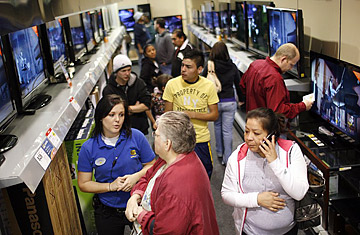
Customers shop for flat-screen and plasma televisions at a Best Buy electronics store in Fort Worth, Texas
'Tis the season to buy that Blu-ray. With Christmas just 10 days away, one sector is emerging as the star of the holiday shopping season: consumer electronics. "We're seeing incredible growth, particularly with netbooks and TVs," says Andrew Hargreaves, an analyst at Pacific Crest Securities. According to the Consumer Electronics Association, 80% of adults say they intend to purchase technology as a gift this year, the highest figure in the 16 years the organization has tracked holiday shopping patterns. On Monday, Dec. 13, Citigroup analyst Kate McShane raised her price target for Best Buy, the country's dominant electronics retailer, from $40 to $45 per share. "We are seeing stronger traffic at [Best Buy] in its laptop, Geek Squad and video-game sections, while traffic remains healthy in TVs and digital cameras," she wrote in a research note.
According to retail expert Brit Beemer, electronics are virtually tied with toys as the top Christmas-gift item for the first time in more than 25 years. In a survey conducted last weekend by Beemer's firm, America's Research Group, and UBS Global Equity Research, 30% of consumers cited electronics when asked what gift they were buying most often (30.8% said toys). Last year, only 23.7% of respondents said they'd purchase an electronics item. The sector's strength has compelled Beemer, for the first time in his 19 years of conducting Christmas consumer surveys, to revise his holiday sales estimate. In early November Beemer predicted a 2.9% drop in retail sales for the holidays. Now he's forecasting just a 1.2% drop in overall holiday sales. "Electronics have been a big bright spot," he says.
What's igniting electronics? The primary factor is price. After Circuit City went out of business earlier this year, you might have thought that Best Buy would use its "last man standing" status to its advantage and hold firm on prices. But other retailers decided they wanted a piece of Circuit City's pie. And to the benefit of holiday shoppers, one of those retailers is Walmart. For example, according to the website TVpredictions.com, Walmart offered a Blu-ray player for $78 on Black Friday, raised the price to more than $100 over the next few weeks and then lowered it back to $78 last Saturday. Best Buy has insisted that it will match its competitors' prices, so with Walmart acting so aggressively, the consumer will always win. "Walmart doesn't care if it makes a lot of money on electronics," says Michael Pachter, an analyst at Wedbush Morgan Securities. "They'll make margins on other stuff in the store."
The NPD Group, a market-research firm, says the average price for LCD TVs was down 22%, to $535, during the week of Black Friday. Notebook-computer prices dropped 26%, to $500, and unit sales of computers increased a whopping 63%. Prices for netbooks, the lighter, more portable cousin to traditional laptop computers, also dropped. Camcorder prices fell 33%. And these days, the deals extend beyond Black Friday. "One of the phenomena we are seeing is that retailers are really stretching the promotional period," says Ross Rubin, consumer-electronics analyst at NPD. "Retailers are looking to prime the pump for 2010 by getting consumers in the store. They're driving momentum while trying put 2009 far behind them."
Good riddance. Of course, the retailers risk cannibalizing their 2010 sales by offering such juicy deals at Christmastime. "The question is, Are we sucking the demand out of the first part of next year?" asks Hargreaves, the Pacific Crest Securities analyst. Perhaps. But that's of no concern to the consumer. For shoppers, cheap electronics in the aisles bring nothing but holiday cheer.
